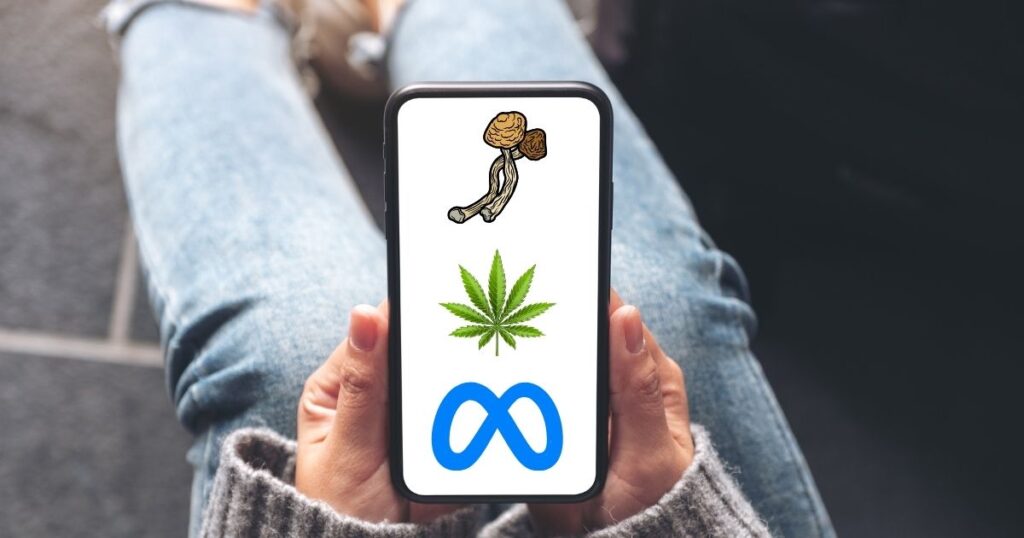Cannabis advocacy and education have made remarkable progress in recent years, but one hurdle remains frustratingly persistent: social media censorship. Meta, the parent company of Facebook and Instagram, has long been criticized for its overly restrictive censorship on cannabis-related content. While Meta has reportedly loosened some restrictions on search results for terms like “marijuana” and “cannabis,” these changes only scratch the surface.
For everyone involved in the cannabis and psychedelics industries, the fight is not just about visibility; it’s about breaking the stigma, fostering dialogue, and ensuring equitable online representation.
A petition by the Students for Sensible Drug Policy (SSDP) is pushing Meta to implement meaningful reforms and end the digital marginalization of cannabis, psychedelic, and harm reduction communities.
Meta’s Censorship, Shadowbans, and Double Standards
Social media has become a lifeline for businesses, educators, and advocates in the cannabis space, but robust moderation policies have consistently kept them in a chokehold.
Meta’s previous practice of blocking search results for terms like “marijuana” is a disproportionate bias against the cannabis industry. Critics have condemned the company for failing to distinguish between illegal drug sales and content aimed at harm reduction, public health education, or legal cannabis advocacy.
This heavy-handed moderation has resulted in shadowbanning, content removal, and account deactivations. Even licensed cannabis businesses, nonprofits, and healthcare professionals have not been spared, despite operating within local legal frameworks.
It begs the question: why the inconsistency? Platforms seem to tolerate content about alcohol and tobacco while targeting cannabis advocates with policies that lack nuance.
Reported Censorship Progress by Meta
Earlier this year, Meta quietly updated its policies, removing blocks on search results for terms like “cannabis” and “marijuana.”, first reported by Marijuana Moment. Previously, users searching for these terms were met with warnings to report drug sales. Advocates hailed this as a step forward, but the relief has been tempered by skepticism.
Meta has not clarified whether this is a long-term change or simply a temporary relaxation of enforcement. Furthermore, cannabis remains flagged for stricter content moderation compared to less stigmatized products like alcohol.
Content creators, businesses, and advocacy groups are still experiencing flagged posts, limited visibility, and resourceful but restrictive advertising policies. For instance, promotional content for CBD products must meet stringent certification requirements and cannot target individuals under 18. THC-related ads, meanwhile, are completely restricted.
Petition to Meta
Censorship of cannabis-related content is not merely an inconvenience; it actively undermines public health and policy reform efforts. Harm reduction services and educational campaigns rely on platforms like Facebook and Instagram to disseminate vital information, from safe consumption practices to advocacy for fair legislation.
Consider this example from the SSDP petition’s open letter to Meta. Social media platforms often censor posts about opioid overdoses and naloxone availability, even though these lifesaving interventions support public health goals and play a crucial role in harm reduction efforts.
Similarly, restrictive policies stifle discussions about the therapeutic benefits of cannabis for conditions like PTSD and chronic pain, despite extensive research supporting its effectiveness. These examples highlight the challenges faced in sharing vital health information on social media platforms.
This stifling of science, advocacy, and education is a disservice to communities that rely on these resources. Meta’s platforms are vital communication tools, and with great influence comes great responsibility.
The petition organized by SSDP and supported by nearly 100 organizations calls for Meta to make four specific reforms to its content moderation policies:
- End discriminatory bans and shadowbans on accounts related to cannabis, psychedelics, and harm reduction when they operate within legal guidelines.
- Establish clear, transparent, and consistent content policies that distinguish between promotion of the sale of illegal substances and legitimate drug education and advocacy.
- Create a dedicated appeals and accountability process specific to drug-related content that includes community stakeholders and subject-matter experts.
- Engage in regular dialogue with the psychedelic, cannabis, and harm reduction communities to better understand our work and co-create equitable guidelines for content moderation.
These reforms aim to level the digital playing field, ensuring that cannabis, psychedelic, and harm reduction communities share content without fear of arbitrary censorship.
The Federal-Platform Conundrum
At the heart of the Meta censorship issue is the misalignment between state-level cannabis legalization and federal prohibition. This places platforms like Meta in a tight spot, balancing state laws with federal oversight.
For cannabis businesses that are state-compliant, the uncertainty surrounding online visibility and advertising policies remains a massive barrier to growth. Without federal reform, this legal gray area will continue hampering progress.
Interestingly, Meta is not alone in struggling with cannabis-related policies. Twitter (now X) has adopted a more cannabis-friendly stance under Elon Musk’s leadership by allowing ads for cannabis products. Apple has also loosened restrictions, enabling apps to facilitate cannabis delivery. Yet Meta remains sluggish in adapting to the evolving landscape.
Where Do We Go from Here?
Ending cannabis censorship across Meta requires a multi-pronged approach that includes public advocacy, corporate accountability, and legislative reform.
The petition to Meta is a critical first step in holding platforms accountable. But it also serves as a rallying cry for broader systemic change, including the federal descheduling of cannabis.
You, too, can lend your voice to this movement. Signing the petition is an easy yet powerful way to advocate for fair treatment of the cannabis community on social platforms. Visit the petition page here to add your name.
The conversation around these communities is evolving, and social media policies must evolve with it. It’s time to free the cannabis community from digital marginalization and empower vital conversations about health, advocacy, and reform.
















